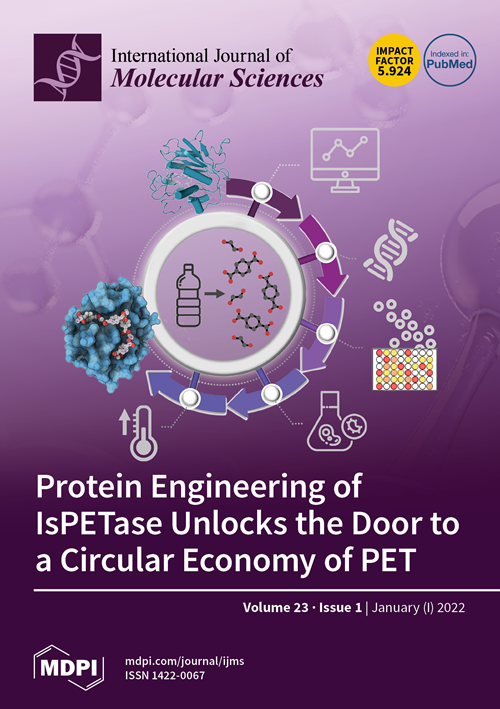卡培他滨药效学相关基因的单核苷酸多态性对结直肠癌辅助治疗效果的影响
IF 4.9
2区 生物学
Q1 BIOCHEMISTRY & MOLECULAR BIOLOGY
引用次数: 0
摘要
结肠直肠癌(CRC)是一种全球高发的肿瘤。卡培他滨是一种口服抗代谢药,被广泛用于治疗结直肠癌。这可能是由于卡培他滨药效学(PD)相关基因的遗传变异造成的。在这项研究中,我们调查了与卡培他滨药效学相关的单核苷酸多态性(SNPs)对接受辅助治疗的 CRC 患者无病生存期(DFS)的影响。使用预先设计的 TaqMan® 探针进行实时 PCR,对 142 例 CRC 患者的 TYMS、ENOSF1、MTHFR、ERCC1/2 和 XRCC1/3 基因中的 13 个 SNPs 进行了基因分型。结果发现,良好的 DFS 与 ENOSF1 rs2612091-T 等位基因(p = 0.010;HR = 0.34;95% CI = 0.14-0.83)以及 TYMS/ENOSF1 区域 ACT 单倍型(p = 0.012;HR = 0.37;95% CI = 0.17-0.80)之间存在明显关联。组织学分级低(p = 0.009;HR = 0.34;95% CI = 0.14-0.79)和癌症家族史(p = 0.040;HR = 0.48;95% CI = 0.23-0.99)等其他因素也与 DFS 的改善有关。因此,SNP ENOSF1 rs2612091可被视为接受以卡培他滨为基础的辅助治疗方案的CRC患者生存率的预测性遗传生物标志物。本文章由计算机程序翻译,如有差异,请以英文原文为准。
Role of Single-Nucleotide Polymorphisms in Genes Implicated in Capecitabine Pharmacodynamics on the Effectiveness of Adjuvant Therapy in Colorectal Cancer
Colorectal cancer (CRC) is a highly prevalent form of neoplasm worldwide. Capecitabine, an oral antimetabolite, is widely used for CRC treatment; however, there exists substantial variation in individual therapy response. This may be due to genetic variations in genes involved in capecitabine pharmacodynamics (PD). In this study, we investigated the role of single-nucleotide polymorphisms (SNPs) related to capecitabine’s PD on disease-free survival (DFS) in CRC patients under adjuvant treatment. Thirteen SNPs in the TYMS, ENOSF1, MTHFR, ERCC1/2, and XRCC1/3 genes were genotyped in 142 CRC patients using real-time PCR with predesigned TaqMan® probes. A significant association was found between favorable DFS and the ENOSF1 rs2612091-T allele (p = 0.010; HR = 0.34; 95% CI = 0.14–0.83), as well as with the TYMS/ENOSF1 region ACT haplotype (p = 0.012; HR = 0.37; 95% CI = 0.17–0.80). Other factors such as low histological grade (p = 0.009; HR = 0.34; 95% CI = 0.14–0.79) and a family history of cancer (p = 0.040; HR = 0.48; 95% CI = 0.23–0.99) were also linked to improved DFS. Therefore, the SNP ENOSF1 rs2612091 could be considered as a predictive genetic biomarker for survival in CRC patients receiving capecitabine-based adjuvant regimens.
求助全文
通过发布文献求助,成功后即可免费获取论文全文。
去求助
来源期刊

International Journal of Molecular Sciences
Chemistry-Organic Chemistry
CiteScore
8.10
自引率
10.70%
发文量
13472
审稿时长
17.49 days
期刊介绍:
The International Journal of Molecular Sciences (ISSN 1422-0067) provides an advanced forum for chemistry, molecular physics (chemical physics and physical chemistry) and molecular biology. It publishes research articles, reviews, communications and short notes. Our aim is to encourage scientists to publish their theoretical and experimental results in as much detail as possible. Therefore, there is no restriction on the length of the papers or the number of electronics supplementary files. For articles with computational results, the full experimental details must be provided so that the results can be reproduced. Electronic files regarding the full details of the calculation and experimental procedure, if unable to be published in a normal way, can be deposited as supplementary material (including animated pictures, videos, interactive Excel sheets, software executables and others).
 求助内容:
求助内容: 应助结果提醒方式:
应助结果提醒方式:


